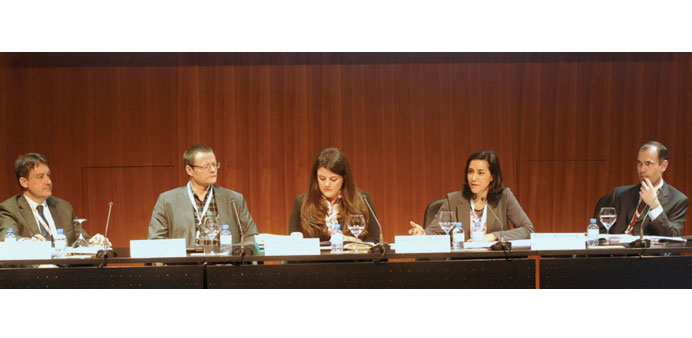A panel of experts discuss the Global Study on Children Deprived of Liberty during one of the side events at the UN Congress on Crime Prevention and Criminal Justice. PICTURE: Shemeer Rasheed
By Joey Aguilar/Staff Reporter
The “significant number” of juvenile pre-trial detainees worldwide are a huge waste of human potential and resources, said Martin Schonteich, a senior official of the National Criminal Justice Reform Programme at Open Society initiative.
Speaking at a sideline event of the United Nations (UN) Congress on Crime Prevention and Criminal Justice yesterday, Schonteich noted that many pre-trial detainees are younger people — mostly children and young adults in their productive years.
“The implications of excessive and arbitrary pre-trial detention impact more than 3mn people on any given day and more than 15mn a year,” he said in his presentation.
Considering the indirect impact on families, relatives and communities, he added that the numbers reach into hundreds of millions.
Schonteich and a panel of experts were discussing the Global Study on Children Deprived of Liberty, which needs to be carried out due to lack of quantitative and qualitative data (particularly disaggregated data), research and verified information on the situation of children deprived of their liberty worldwide.
The campaign was started in August 2013 by gathering as many non-governmental organisations as possible to join the call.
A series of discussions about the scope of the study and how to bring it as far as possible were also held.
The initiative tries to promote the adoption of good and sensible pre-trial justice standards regionally and internationally, according to Schonteich.
“The extent of pre-trial detention varies from one part of the world to the next globally, about one for every third prisoner is about 10mn prisoners around the world,” he said.
“About one in every third prisoner is awaiting trial.”
A number of negative consequences as a result of excessive juvenile pre-trial detention also accrue such as the spread of communicable diseases due to poor conditions and unhealthy accommodation lacking supervision by specially trained staff.
Detainees are also prone to suicide, abuse and torture.
He said abuse and torture tends to be disproportionately focused on the early stage of the criminal justice process where police and prosecutors try to force confessions.
“Conclusion of repertoire” was that vast majority of accused children are a result of petty crimes or uncontrollable behaviours and not serious offences. In many cases, Schonteich said children in pre-detention trials are acquitted at the end of their trial. They are either acquitted or penalised with a crime which is minor in nature.
In Australia, around 55% of adults were eventually released while for juveniles, it was about 80%.
“But it seems the disparity in the arbitrary pre-trial detention affects juveniles more negatively than adults,” he added.
Since juvenile detainees are not separated from adults in jails, violence heightens and this typically happens in many police stations.

